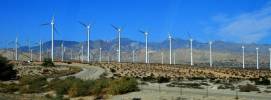Landfill expansion for plant opposed
Fearing that expansion of a coal-fired power plant's landfill will amplify pollution around NV Energy's Reid Gardner station, environmentalists and members of the Moapa Band of Paiutes say local public health authorities should deny the aging plant's permit request.
"You should come out and look at it on a windy day. It's killing us," Eric Lee of the Paiute tribe told Southern Nevada Health District board members Monday night at a packed meeting at the Moapa Recreation Center.
Others from the Moapa Band of Paiutes echoed his concerns and spoke of health problems among many of the more than 200 residents of the reservation adjacent to the Reid Gardner station, 50 miles northeast of Las Vegas.
They urged the board to conduct a multi-agency study of the band's health concerns.
Some complained of respiratory problems they attribute to fine particulate matter that sometimes falls on the community. They said it comes down like snowflakes.
One member of the band, Calvin Meyers, said he sought monitoring reports from the plant. When he obtained them, the data had gaps. He could not understand it.
"For me, it was like getting a message from Mars," Meyers said.
"What we need to do is get somebody else to do the monitoring, somebody not paid for by" NV Energy, he said.
An attorney for the Western Environmental Law Center also spoke against the power company's permit application to expand the landfill, where more than 10 million cubic yards of coal-combustion wastes would be stored, enough for 33 more years of coal-ash disposal at the plant.
"To grant this permit would flatly conflict with the board's mandate to protect public health and the environment," said law center attorney Dan Galpern, who spoke on behalf of his client, the Sierra Club.
The application will be the subject of a public hearing Oct. 28 in Las Vegas.
On Tuesday, the Sierra Club's Las Vegas organizer Vinny Spotleson said coal ash "is very, very dangerous and very dirty."
"It causes more cases of cancer per exposure than smoking a pack of cigarettes per day. The Southern Nevada Health District must deny this permit to protect human health," Spotleson said.
Citing Nevada laws that charge the health board with protecting public health and state waters, Galpern said the board's legal mandate "cannot be waived. ... The board is obliged to protect the public by ensuring that no permit it issues 'causes or contributes' to pollution."
Galpern asserted that there are several reasons for the board to deny the permit request including the power company's failure to appropriately characterize and analyze wastes for disposal.
He said allowing the company to expand the landfill would compound contamination from the site that historically had seeped from evaporation ponds before they either were closed or equipped with high-density plastic liners.
NV Energy Environmental Services Manager Tony Garcia said the Reid Gardner station is complying with federal standards for continued operation of the plant despite problems in the late 1990s with excessive levels of several pollutants that had seeped from evaporation ponds.
The company reported the problem to the Nevada Division of Environmental Protection and was given 10 years to correct it.
After the plant began operating in 1965, it was in compliance with environmental laws at the time, he noted.
"The Sierra Club is not shy about its intentions to close the Reid Gardner Generating Station," Garcia said. "While we certainly respect their right to challenge and disagree, we have an obligation to our customers to continue to run the power plant with or without this permit."
He urged the health board to approve the permit for expanding its landfill because the company would be able to continue to remove pond solids from the Muddy River flood plain.
Charles H. Norris, a Colorado-based hydrogeology consultant for Western Environmental Law Center, said NV Energy's permit application lacks a comprehensive analysis of the waste stream that comes from burning coal that is mined in Utah and Wyoming.
Besides quantifying the waste stream for a list of elements that includes arsenic, boron, chloride, potassium, zinc, chromium and other metals, a radiological assessment "is also necessary," Norris wrote in a memo he presented to Linda Strickland, health board chairwoman and Boulder City Council member.
"Naturally occurring radionuclides in the coal -- uranium, thorium and potassium -- are concentrated in the ash products," Norris wrote.
In 2006, the Moapa Band of Paiutes complained of rotten-egg odor from hydrogen sulfide gas emanating from the ponds. Long-term exposure to low levels of hydrogen sulfide gas can cause fatigue, headaches, poor memory and dizziness.
Contact reporter Keith Rogers at krogers@reviewjournal.com or 702-383-0308.




























